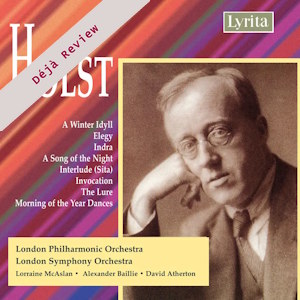
Déjà Review: this review was first published in April 2004 and the recording is still available.
Gustav Holst (1874-1934)
Orchestral Works
Lorraine McAslan (violin); Alexander Baillie (cello)
London Philharmonic Orchestra, London Symphony Orchestra/David Atherton
rec. 1982. DDD/ADD
Lyrita SRCD209 [76]
This 76-minute collection of shorter works by Holst offers up a series of delights whilst revealing various sides of that composer’s character. A Winter Idyll shows a very approachable Holst, with open-air textures and tunes (‘tunes’ more than ‘themes’, or even ‘melodies’) that exude playfulness. David Atherton inspires the LPO to great heights of precision and they play with heartfelt advocacy.
The Elegy (In Memoriam William Morris) is a work of great integrity. More than this, though, it is simply gorgeous in its dark, lush colourings. Impassioned, concentrated and confident, it builds impressively to a powerful climax. The piece is actually the second movement from the so-called ‘Cotswolds’ Symphony. Astonishingly, the symphony was in effect forgotten after its 1902 premiere until its revival in 1982.
Indra is Holst’s earliest completed extended work from his ‘Indian period’. Holst was later to set hymns from the Rig Veda, between 1907 and 1912. The work is full of glowing textures; a climax (around four minutes in) features blazing brass. The performance under Atherton’s baton is remarkable convincing, mainly because he is able to keep the overall structure in mind despite the many passages where there might be a temptation to linger.
Two works for solo instrument and orchestra make an appearance. First, A Song of the Night, composed in 1905 but not performed, Lewis Foreman’s notes tell us, until 1984. Lorraine McAslan produces an appropriately throaty tone for the work’s opening, then ruminates long and deeply. This is an involving meditation during which McAslan’s filigree and soaring phrases confirm her affinity with Holst’s music.
Invocation was intended as a companion piece to A Song of the Night and it, too, is blessed with a seemingly ideal soloist (here cellist Alexander Baillie). Baillie plays Invocation so lovingly and yet so plaintively that this account leaves a lasting impression on the listener.
The two solo items sandwich the more intense, punchy Interlude from Act 3 of Sita. This six-minute interlude is absolutely full of life, Atherton projecting a visceral feeling of mystic ecstasy.
For the final two items, the LSO is used. The music for the ballet The Lure came about in response to a commission from Chicago. Holst uses a folk-tune from W. G. Whittaker’s North Countrie Ballads, Songs and Pipe-Tunes (it appears at 4’13). However, it appears the ballet was never staged and this recording (edited by Imogen Holst and Colin Matthews) seems to be its first manifestation, live or on disc. It is a dynamic, exciting work that deserves inclusion in the orchestral repertoire.
The Morning of the Year was the first score ever commissioned by the BBC Music Department (the work is a representation of mating in Spring!). Here we have the four Dances, plus Introduction (in the ballet the dances alternate with choral interludes). The Dances are recorded in a concert version edited by Imogen Holst and Colin Matthews. They take in a wide variety of moods, vividly painted and superbly recorded here.
This disc magnificently proves that ‘lesser-known’ does not necessarily equate to ‘lesser’ – there are some remarkable finds here. There is much more to Holst than, say The Planets and The Perfect Fool. Here is a good place as any (and better than most) to embark on the voyage of discovery.
Colin Clarke
Buying this recording via a link below generates revenue for MWI, which helps the site remain free



Contents
A Winter Idyll (1897)
The Cotswolds Symphony in F, Op. 8 – Elegy (In Memoriam William Morris) (1899-1900)
Indra, Op. 13 (1903)
A Song of the Night, Op. 19 No. 1 (1905)
Sita – Act III, Interlude
Invocation, Op. 19 No. 2 (1911)
The Lure (Ballet Music for Orchestra) (1921)
Dances from ‘The Morning of the Year’, Op. 45 No. 2 (1926-7)

















